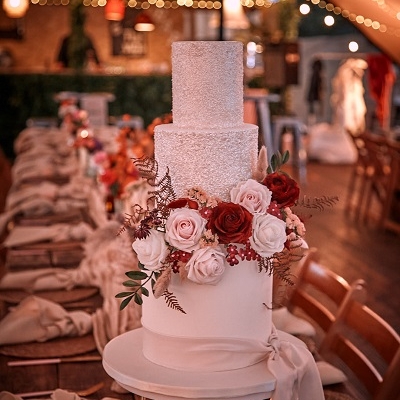Here is a selection of Q&As from Your Herts and Beds Wedding magazine whether it be about flowers, hair and makeup, fashion, wedding themes, health & beauty, cakes, stationery, legal advice. If you would like your question answered by our experts, please email it to editor@yourhertsbeds.wedding
To view more expert advice on a different topic, please select one from the list below.

What's Your Flavour?
| Q | What are the most popular wedding cake flavours? |
| A | Stacey Badger says: The key thing to consider is what you truly want or enjoy. I can share popular ideas or suggest combinations that might work well. However, if I recommend something that doesn't resonate with you, it could dampen the excitement and turn it into something you feel obligated to choose. Remember, your wedding should reflect your preferences, which matters most! In the eight years I've run The Mad Batter, I've had just one inquiry about a fruit cake topped with marzipan and icing. If tradition is your top priority, then that's the way to go without hesitation. However, it's your wedding, and it's all about what you desire, so be sure to include all your favourite treats. Whether that means opting for various desserts or mixing different flavours for the tiers, what you love should always take precedence on your special day. If we're talking seasonal advice and pairings, then spring and summer usually look like Victoria sponge, strawberry and prosecco, lemon and blueberry, white chocolate and raspberry and elderflower flavours. In winter, it changes to carrot cake, chocolate orange, salted caramel and apple and cinnamon. Seasonal always work well when using fresh ingredients, the cake will taste amazing while reflecting the time of year you're getting married. |
Stacey Badger, The Mad Batter’s Baked Goods

Winter Wonderland
| Q | I plan to tie the knot next December and want a winter-inspired cake that will wow our guests. Do you have any ideas? |
| A | Angela Hodson-Jones says: Oh, magical winter weddings! Twinkling lights, snow-covered ground, cosy candles and delicious, indulgent, and decadent menus! I love it when couples fully embrace festive colour schemes for this time of year, opting for elegant white cake tiers featuring sparkles or textured elements, silver leaf, and blue tones with colourful and indulgent designs of rich reds, greens and gold. Your wedding cake vision might include an elegant, white-tiered cake featuring an oversized draping bow and delicate romantic pearls. You can dress it up with floral pops of colour or have tiers fully covered in translucent sparkles to catch the light. Consider a beautiful hand-painted cake depicting subtle wintry elements. Alternatively, choose a dark base tier with remaining tiers in a neutral shade or add some drama with a dark fully iced cake, featuring edible gold leaf accents paired with delicate florals. Sugar flowers are a winning combination for cakes at any time of year. The flexibility of handcrafted flowers provides options for any variety and colour, regardless of those featured in your wedding styling. White peonies in December? Yes, please! Consider styling your cake table, perhaps a flower meadow, candles and twinkling lights, or even playful mini disco glitter balls and snowflakes. Rich velvet linen and seasonal greenery paired with a pedestal stand would elevate and create a memorable centrepiece! Don't forget those indulgent cake flavours too. Often, my winter wedding couples opt for a warming, lightly spiced carrot cake paired with a vanilla bean Swiss meringue buttercream or an indulgent chocolate fudge with raspberry gelee and raspberry buttercream! Once you have booked your wedding cake designer, enjoy the fun of designing the wedding cake you dreamed of. |
Angela Hodson-Jones, Angela Jane Cake Design

Baked With Love
| Q | What flavours would you suggest for our Christmas-themed wedding cake? |
| A | Sarah Sacco says: Christmas always makes me think of spices and warmth; many cake flavours instantly make you think of this special time of year. Here are a couple of my favourites... •Orange, apricot and ginger sponge filled with apricot conserve and vanilla buttercream. The hint of ginger makes you think of gingerbread, and the orange gives it a lovely citrusy hit. •Spiced carrot cake filled with orange buttercream. You get the warmth of the ginger and cinnamon spices in the cake combined with the carrot and walnuts, while the orange buttercream breaks up the sweetness without overpowering the sponge. |
Sarah Sacco, Layers & Graces